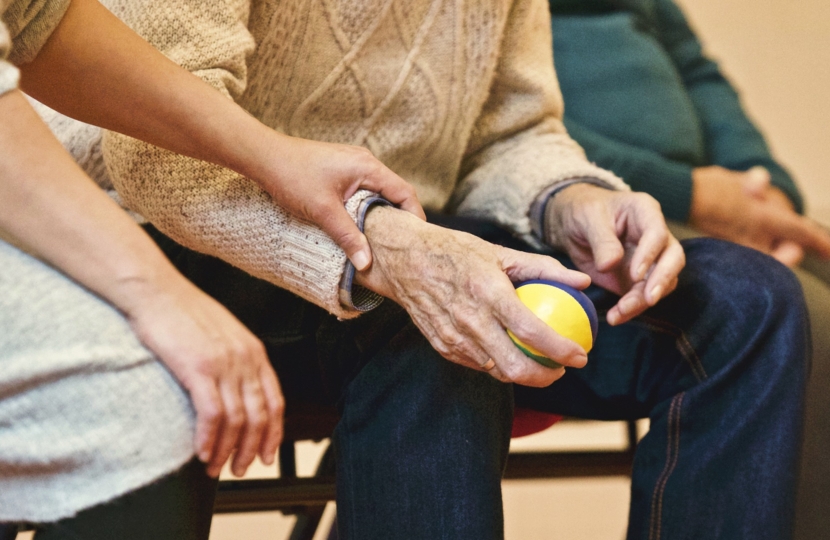
Yesterday I held an online meeting with the leaders of five of Wiltshire’s charities working with elderly people and vulnerable adults.* We were also joined by Councillor Laura Mayes and Alison Elliot, who oversee adult social care for Wiltshire Council.
Of course the immediate issue they all face is the threat to elderly and vulnerable people, and the carers and care workers who support them, from Covid-19. The tragic fact is that infection and death rates continue to rise in care homes. The great achievement of social distancing has been to ensure the NHS is not overwhelmed, and everyone who needs hospital treatment is able to receive it. Our care sector too has been magnificent. There are real concerns about the availability of Protective Personal Equipment (PPE). I am relieved to say that Wiltshire care home staff have sufficient PPE, but the supply is patchy, and with rising infections we need to improve the volume and speed of deliveries.
Beyond the immediate crisis, the purpose of the meeting was to discuss the future of social care. And because of the terrible threat that Covid-19 poses to elderly people, we are seeing this population - too often invisible in the media and policy-making - finally receiving the attention they need; we are seeing a new respect for care workers; and we are seeing a new spirit of cooperation across the different organisations that are responsible for adult social care: council, NHS, business and civil society.
Talking to the charity leaders I was struck by their spirit of cooperation and the determination to work together rather than (as happens so often in the public and social sectors) in competitive silos. The council, too, seem willing to take risks, to trust residents and charities (always difficult for a big statutory organisation). All agreed that the local NHS (or to give it its full title, which tells you something of the bureaucratic challenge involved, the Bath and North East Somerset, Wiltshire and Swindon Clinical Commissioning Group) is being forced into a more collaborative mode by the crisis; and all hoped this would continue once the crisis passes.
Since 2018 Wiltshire Council has been putting measures in place to integrate local health and social care systems. The intention is to help people live independently at home for longer, or to help them return home more quickly after a hospital stay, and to reduce delays created when someone is transferred from one service to another – instead, all parts of a person’s care can be managed by one local team. The system involves partnerships between GPs, community health teams, hospitals and council social care teams.
Britain’s population is aging, and Wiltshire’s population is aging faster than the average. The number of people in the county aged 65 and over is set to rise by 41 per cent from 2016 to 2030. Increasing financial pressures and a changing population, combined with people living with more complex and long-term conditions means we must continue to find new ways of giving residents security and dignity in old age, and - crucially - choice over what that looks like for each individual.
Overall, as Babs Harris from Alzheimer Support told us, ‘social care should sit with the people who need it.’ That means the organisation of care shouldn’t be a turf war between NHS and councils, charities and private companies. As far as possible care should be managed by the individual, or their family, who receives it.
The people who deliver care - and there is an important distinction between ‘carers’, meaning the unpaid friend or family member who looks after a loved one or a neighbour, and professional ‘care workers’ - all need more support, including better pay and allowances. There is real concern about the economic model underpinning social care in Wiltshire, with most paid care delivered by a small number of large private companies. Meanwhile carers are stretched and stressed by the challenge of looking after their loved ones with not enough support.
The Government has committed to cross-party talks on the future of social care. As the coronavirus crisis has highlighted, the system needs profound reform. Here in Wiltshire we have a council and a care sector that work well together in a broken system, and are determined to improve it. I want to work with Government to make sure they get the reforms they need to make this possible. I will be writing to Matt Hancock, Secretary of State for Heath and Social Care, with a set of ideas arising from conversations like the one I had yesterday.
The heart of the system we need is a loving, empowering community, that respects the independence and dignity of a vulnerable individual and puts in place the support that is right for them. ‘It’s time for new ways of thinking,’ as Judy Walker from Carer Support Wiltshire told us, ‘or maybe old ways of thinking.’
* My thanks to Geraldine Bentley (Centre for Independent Living), Babs Harris (Alzheimer Support), Julian Kirby (Age UK Wiltshire), Judy Walker (Carer Support Wiltshire), and Suzanne Wigmore (Wiltshire Citizens Advice Bureau)





